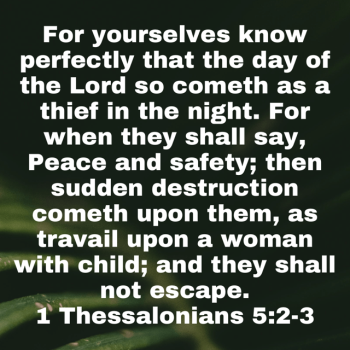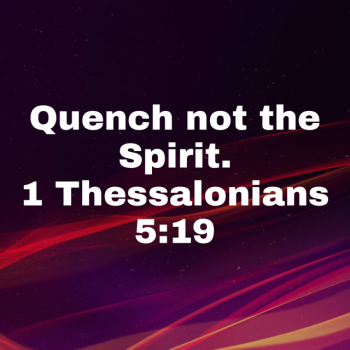The Word of God (vv. 19–21). Apart from God’s
Word, we have no certain revelation from the Lord.
Worship that ignores the Bible is not spiritual. There
may be emotion—and even commotion—but unless
there is spiritual truth, the Holy Spirit is not at work.
The three admonitions in these verses go together and
help us understand how the Holy Spirit works in
Christian worship.
The early church did not have a completed Bible as
we do. The Holy Spirit gave the gift of prophecy to certain members of the church and would speak the
message through them. When I preach in a church
service, I preach the truth immediately by means of the
Bible. These early prophets preached the truth immediately as they were moved by the Holy Spirit. Their
spiritual knowledge was given to them by the Spirit,
and often they spoke in a tongue. This is why the three
gifts of prophecy, tongues, and knowledge are grouped
together in 1 Corinthians 13.
Of course, there are dangers in this kind of ministry, because Satan (or the flesh) could seek to
counterfeit a message from God, and thus lead the
church astray. If the church restrained the speakers,
they might be guilty of quenching the Spirit. If they
believed all that was spoken, they might be obeying
false spirits. The answer was to “prove all things.” There
must be a discerning of the spirits (1 Cor. 12:10; 1
John 4:1–4). Paul gave specific rules for this in 1
Corinthians 14:29–33.
Today, we have a completed revelation in the Word
of God and there is no need for prophets. The apostles
and prophets helped lay the foundation of the church
(Eph. 2:20) and have now passed from the scene. The
only “prophetic ministry” we have is in the preaching
and teaching of the Word of God.
In using the word quench, Paul pictured the Spirit
of God as fire (see Isa. 4:4; Acts 2:3; Rev. 4:5). Fire
speaks of purity, power, light, warmth, and (if necessary) destruction. When the Holy Spirit is at work in
our lives and churches, we have a warmth of love in our
hearts, light for our minds, and energy for our wills. He
“melts us together” so that there is harmony and cooperation, and He purifies us so that we put away sin.
The fire of the Spirit must not go out on the altar
of our hearts; we must maintain that devotion to
Christ that motivates and energizes our lives.
Wiersbe.
Quench not the Spirit
Since he is the inspirer of prayer, and the bestower of all gifts of grace on the Church. Comp. Eph_4:30. The operation of the Spirit is set forth under the image of fire in Mat_3:11; Luk_12:49; Act_2:3, Act_2:4. The reference here is to the work of the Spirit generally, and not specially to his inspiration of prayer or prophecy.
VWP
5:19
NASB, NKJV, NRSV, Peshitta "Do not quench the Spirit"
TEV "Do not restrain the Holy Spirit"
NJB "Never try to suppress the Spirit"
REB "Do not stifle inspiration"
Verses 19-20 are PRESENT ACTIVE IMPERTIVES with the NEGATIVE PARTICLE, usually meaning stop an act in process. The Williams translation has "stop stifling the Spirit." The five IMPERATIVES of 1 Thess. 5:19-22 must go together. The first two NEGATIVE IMPERATIVES of 1 Thess. 5:19, 20 set the boundaries for the three POSITIVE IMPERATIVES of 1 Thess. 5:21-22. "Quench" means "to put out a fire." Our actions affect the working of the Spirit (cf. Isa. 63:10; Eph. 4:30).
5:20
NASB "do not despise prophetic utterances"
NKJV "Do not despise prophecies"
NRSV "Do not despise the words of prophets"
TEV "do not despise inspired messages"
NJB "never. . .treat the gift of prophecy with contempt"
The definition of "prophecy" in the NT has been much debated. The gift is included in the list of spiritual gifts in 1 Cor. 12:28-29 and Eph. 4:11. How the Scripture writing prophets of the OT are related to the post-apostolic gift of "prophecy" is uncertain. Most scholars want to limit inspiration/revelation to the NT period (i.e., "the Faith which was once for all delivered to the saints," cf. Jude).
Clearly NT prophets are not synonymous with OT prophets. The NT gift usually relates to practical application issues, not new revelatory information. However, there is a predictive element in Acts 11:27-30 and 21:10-11. In 1 and 2 Corinthians prophecy and prophesy (cf. 1 Cor. 13:1; 14:1,39) mean proclaim the gospel. Exactly how this proclamation differed between apostles, prophets, evangelists, pastors, and teachers (i.e., Eph. 4:11) is uncertain.
Verse 20 is in some way related to 1 Thess. 5:19. Exactly how this fits into the Thessalonian church is uncertain. Believers must vigorously reject false leaders, but enthusiastically embrace godly leaders (possibly Jewish trouble makers).
Utley.
1 Thessalonians 5:19 (KJV)
"Quench not the Spirit."
Context and Explanation
Immediate Context
1 Thessalonians 5:16-22:
Verses 16-18: "Rejoice evermore. Pray without ceasing. In every thing give thanks: for this is the will of God in Christ Jesus concerning you."
Verse 20: "Despise not prophesyings."
Verse 21: "Prove all things; hold fast that which is good."
Verse 22: "Abstain from all appearance of evil."
Paul is giving a series of final instructions to the Thessalonian believers, which includes rejoicing, constant prayer, giving thanks, not despising prophecies, testing everything, holding onto what is good, and avoiding evil.
Cessationist Interpretation
Quenching the Spirit:
General Guidance: Cessationists understand "quenching the Spirit" as a broad admonition not to suppress or ignore the Holy Spirit’s work. This includes maintaining a life characterized by joy, prayer, and gratitude, as these are Spirit-produced qualities (Galatians 5:22-23).
Spiritual Sensitivity: It emphasizes the need for believers to be sensitive to the Spirit’s leading in aspects such as understanding Scripture, growing in holiness, and fostering a godly community.
Despising Prophecies:
Historical Context: During the apostolic age, prophecies were a way God communicated directly with the church. Cessationists believe that once the canon of Scripture was completed, the need for such direct revelation ceased.
Modern Application: Today, this might be understood as valuing and adhering to the already revealed Word of God in Scripture. Rather than expecting new prophetic revelations, believers are encouraged to study and apply the Bible, which the Holy Spirit uses to teach and guide them (2 Timothy 3:16-17).
Proving All Things:
Discernment: Cessationists place a strong emphasis on testing and discerning teachings and practices against the completed revelation of Scripture. This is consistent with the exhortation in 1 John 4:1 to "test the spirits to see whether they are from God."
Theological Implications
Role of the Holy Spirit:
Illumination: The Holy Spirit continues to play a crucial role in illuminating Scripture, enabling believers to understand and apply its truths (John 16:13).
Sanctification: The Spirit is essential for sanctification, transforming believers into the image of Christ through the Word (2 Corinthians 3:18).
Avoiding Extremes:
Guarding Against Emotionalism: Cessationists caution against equating emotional experiences or subjective impressions with the Spirit’s leading, emphasizing the objective truth of Scripture as the primary guide.
Rejecting Charismatic Excesses: They reject practices and doctrines that claim ongoing miraculous gifts or new revelations, viewing these as potentially distracting from or undermining the sufficiency of Scripture.
Practical Application
Scriptural Study:
Diligent Study: Believers should be diligent in studying the Bible, relying on the Holy Spirit to illuminate and apply its truths in their lives (Psalm 119:18).
Sound Doctrine: They should seek sound teaching and doctrine, ensuring that their beliefs and practices align with biblical revelation (Titus 1:9).
Spiritual Growth:
Prayer and Holiness: Cessationists emphasize the importance of prayer, personal holiness, and dependence on the Spirit for daily Christian living (Ephesians 6:18).
Community Life: They encourage fostering a godly community through mutual edification, accountability, and adherence to scriptural principles (Hebrews 10:24-25).
Conclusion
From a cessationist perspective,
1 Thessalonians 5:19, "Quench not the Spirit," is understood as a call to maintain sensitivity to the Holy Spirit’s ongoing work through the Scriptures and in the sanctification of believers. It emphasizes living a Spirit-led life characterized by joy, prayer, gratitude, and adherence to biblical truth. While cessationists believe that certain miraculous gifts have ceased, they affirm the essential and continuous role of the Holy Spirit in illuminating Scripture, guiding believers, and transforming lives.
I don't fall in with the world's way of thinking and interpreting Scriptures--but we have little gods all for spectacular "gifts" and emotional experiences-just go by what stands written.



